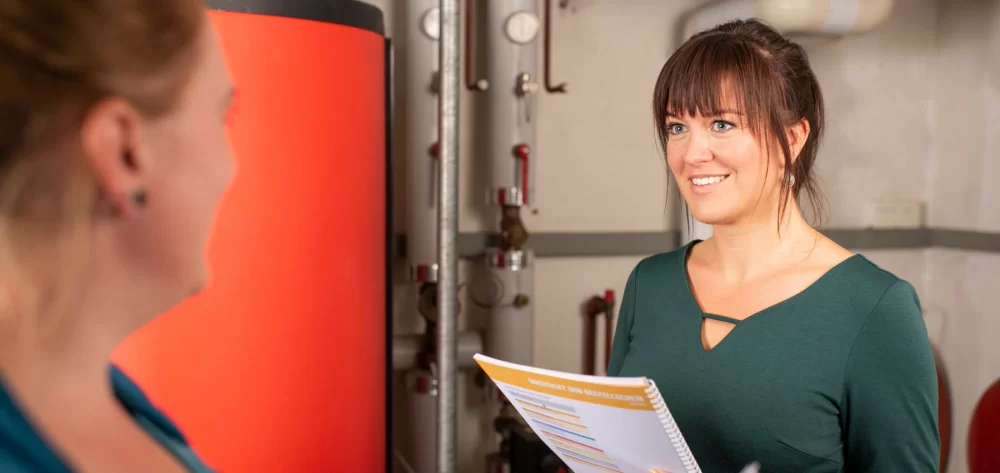I want to replace my old heating system with one based on renewable energy: How should I go about it?
First of all, you have to know which heating system is the best match for your specific property. The selection includes heat pumps, geothermal heating systems, solar thermal collectors, pellet heating, and district heating. Deciding which system to use can be difficult, and factors specific to the property, like its location and condition, also play a role. Each system has its advantages and disadvantages.
The free consultation from the Erneuerbar Heizen / Chauffez Renouvelable renewable heating program helps guide you in your search for the right heating system. It shows you, in a personalized way, which system is the best choice for your property.
Once you have made your decision, you should get two or three quotes from different heating installation service providers, compare them, and choose the best offer. Normally, the installation will be carried out in the summer months.
Does migrating to a renewable heating system also benefit me financially? What should I pay attention to?
Many people initially get scared off when looking at the high initial investment required. Renewable heating systems are often more expensive to install than systems based on oil or gas. But when you account for subsidies, CO2 taxes, and tax deductions, then renewable heating often works out cheaper over the long term.
To find out whether renewable heating makes financial sense, you should compare the total costs over the heating system’s full lifespan of around 20 years. The online heating cost calculator from Erneuerbar Heizen / Chauffez Renouvelable lets you compare the costs of different fossil-fuel and renewable heating systems against each other.
Which subsidies can I apply for?
Swiss federal and cantonal governments, and many municipalities, subsidize the installation of renewable heating systems. There are various eligibility requirements for subsidies. The consultation you can get from the renewable heating program tells you which subsidies you are eligible for in your location. Important: You must apply for subsidies before carrying out the installation.
Can I use my retirement savings to finance an installation?
Installations that maintain or increase the value of a property used as your primary residence can be financed using money from your Swiss occupational pension fund and the pillar 3a. It can be beneficial to contact your pension fund or retirement foundation and ask them whether you can make an early withdrawal to finance the replacement of your heating system. You should be aware that the money you withdraw reduces your retirement savings, and to some extent your death and disability benefits also. You should aim to repair these gaps by saving additional money and possibly getting term life insurance, if necessary.
Are there other ways to finance a renewable heating installation?
Increasing the size of your mortgage can be an option if you meet the affordability requirements for a bigger mortgage. The combined costs of interest, mortgage repayments, and building maintenance cannot exceed one-third of your income. You should also be aware that the bank will reassess the property’s value. Your mortgage cannot exceed 80 percent of the property’s market value.
Which tax deductions can I claim?
The costs of installing the new heating system are tax-deductible – except for the part that is covered by subsidies. If the cost of energy-saving measures exceeds your taxable income, you can deduct it from your taxable income over up to three different tax years. The ability to claim the deduction over three different years can save you money by lowering your tax bracket.
What are the insurance aspects of replacing my heating system?
Important: Before deciding on which kind of heating system to use, check the terms and conditions of your property insurance. Relevant factors include things like coverage for hail damage to solar thermal collectors. Additionally, you should ask your property insurance provider whether the changes to the building would change the amount of insurance you need, and whether the insurance would cover the new heating system.
It can also be beneficial to get insurance to cover the reconstruction itself. Getting construction insurance is highly advisable, and liability insurance for owners of properties under construction may also be beneficial. You should also get insured against the risk of water damage. Other supplemental insurance types, such as insurance against construction mistakes, short circuits, and vandalism are often unnecessary.
How does consultation from the renewable heating program work?
Consultation is individualized on the basis of your personal situation and accounts for all relevant investment, maintenance, and energy costs, as well as subsidies and tax benefits. For that purpose, a specialist gets an overview of your personal situation. The specialist determines the age and condition of your heating system and the building enclosure, compares the heating costs, and explains the best option for your situation.
If you decide to move to renewable heating, a checklist will inform you about the next steps to take.
A major advantage is that this consultation is free of charge for you as the homeowner on the condition that the system you are replacing is at least 10 years old.
Additional information:
Free consultation from Erneuerbar Heizen / Chauffez Renouvelable



